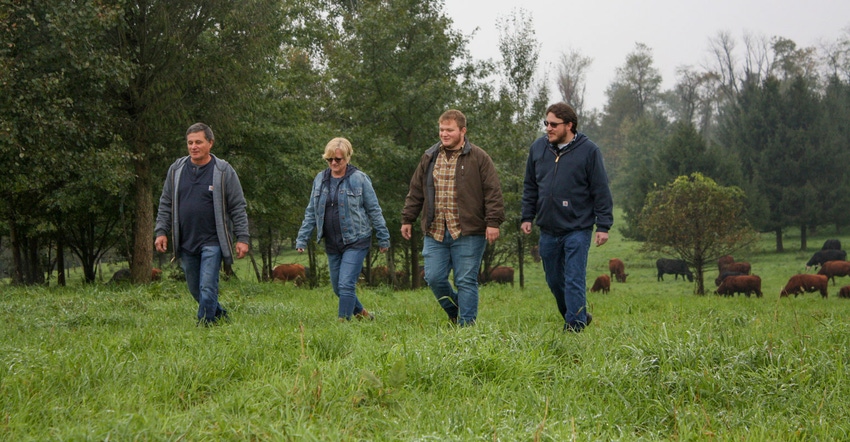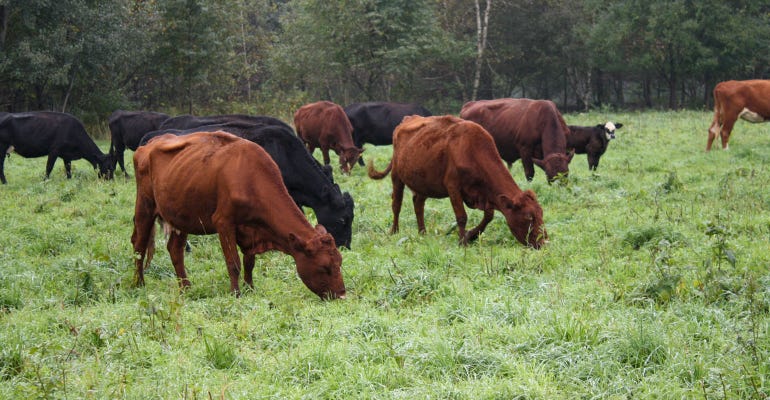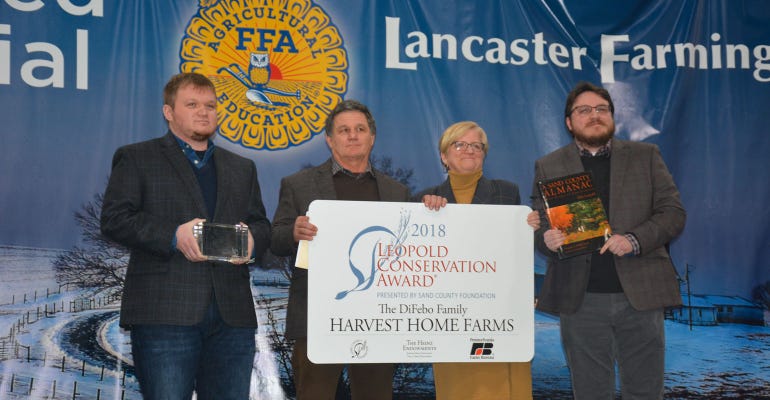
Richard DiFebo’s background in the lawn care business has taught him the importance of crop diversity and soil conservation on his beef operation, Harvest Home Meats LLC. “Knowing the importance of diversity, how diversity relates to healthy soil, healthy crops,” DiFebo said. “Plus, I’ve been on the farm for 42 years.”
But getting recognized for his conservation practices was never a goal. So, when he found out that he and his family had been named the first-ever recipients of the Pennsylvania Leopold Conservation Award, he was shocked, and happy.
“I never thought it would be happening in a million years really,” he said during a ceremony at this year’s Pennsylvania Farm Show. “It’s wonderful for the whole family.”
The Leopold Conservation Award is given in 14 states by the Sand County Foundation, the nation’s leading voice for private conservation, and is named in honor of renowned conservationist Aldo Leopold. At the show, the DiFebos were presented with a $10,000 check and a crystal award depicting Aldo Leopold. The Heinz Endowments, Pennsylvania Farm Bureau and Sand County Foundation sponsor the award in Pennsylvania.
Conservation for the future
Richard DiFebo took over his family’s former dairy farm in Bangor, Pa., in the 1990s. He wanted to continue the farm for his sons, so he started researching niche products to cater directly to customers. Northampton County, where the farm is located, is close to both New York City and Philadelphia.
He started raising grass-fed beef, and he planted conventional corn and soybean fields in permanent grasses both for pasture and to reduce erosion. With financial assistance from Ducks Unlimited, streams and ponds were fenced off to keep the cattle from eroding the banks. Rotational grazing paddocks were created from 175 acres.
The farm includes 130 acres of hay and 30 acres of forage, including sorghum, oats and crimson clover.
 FINDING A NICHE: Farming in fast-growing Northampton County can be difficult, but the DiFebos have found a niche market in grass-fed beef.
FINDING A NICHE: Farming in fast-growing Northampton County can be difficult, but the DiFebos have found a niche market in grass-fed beef.

His son, Dohl, joined him on the farm after graduating college. The two started planting cover crops, contour strips and grass waterways. A desolate shale pit was reclaimed to support plant growth and pasture.
The USDA’s Natural Resources Conservation Service provided money for additional fencing and farm lanes while the Department of Energy provided funds for a solar-powered watering system.
The DiFebos then collaborated with a local school district and the Martins-Jacoby Watershed to turn an abandoned tree farm into pasture along with an outdoor classroom to promote the benefits of grazing and other conservation practices.
Finding trendsetters
Lance Irving, national director of the Leopold Conservation Award, says the program recognizes farms of all sizes, from a rice farm in California to a northern Wisconsin forestry landowner.
“The common thread is just that inherent love of the land. It’s trying to learn what they can do with their own land, not necessarily for their benefit, but for the next generation and the community,” he said. “So, these are folks who are early adapters of new techniques, new technologies. They are early adapters because they are always searching for ‘what can I do better.’”
The award started in 2003 in Colorado.
 FIRST WINNERS: The DiFebos are the first-ever winners of the Pennsylvania Leopold Conservation Award. They were recognized at this year’s Pennsylvania Farm Show. Pictured are Dohl (left), Richard, Lynn and Dane DiFebo.
FIRST WINNERS: The DiFebos are the first-ever winners of the Pennsylvania Leopold Conservation Award. They were recognized at this year’s Pennsylvania Farm Show. Pictured are Dohl (left), Richard, Lynn and Dane DiFebo.

Lynn DiFebo, Richard DiFebo’s wife, says the award means a lot.
“When you do things for many years and you don’t realize that you’re doing something important until something like this happens, now we know that hard work is worth something,” she said.
About the Author(s)
You May Also Like






